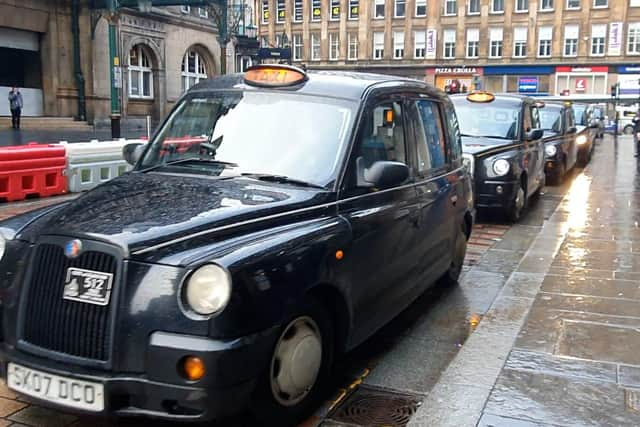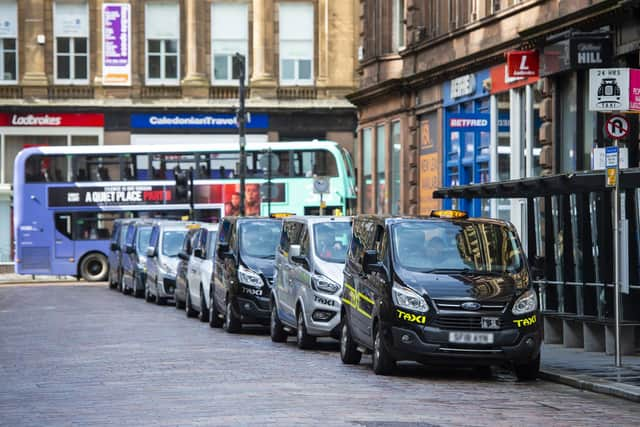'They are literally at their wits’ end – and can see no way forward': How Covid put the brakes on Scotland's taxi sector
But for a much quicker answer, someone could instead simply jump in the back of a cab and get the driver’s plugged-in views on the lay of the land.
It has been estimated there are more than 37,000 taxi driver and private hire licenses in Scotland, and their working week would, in pre-Covid times, see the meter switched on for any and every sector, spanning public and private.
Advertisement
Hide AdAdvertisement
Hide AdThat could include everything from early-morning trips taking bleary-eyed travellers to the airport, to ferrying workers between business meetings, patients to and from hospital, and transporting revellers to and from a night out.


"No other transport system can adjust so readily and so very successfully to the infinitely variable needs of their customers,” says the Scottish Taxi Federation (STF), which says it represents a trade that is “a major industry in its own right”.
But the sector found business saw the brakes slammed on as the Covid-19 outbreak hit the accelerator.
"I have been out four hours now and I have done two fares – and managed to make enough for a coffee,” said one driver in December, while another in January reported feeling like the world was “closing in” amid his skyrocketing debts.


And while eased lockdown restrictions have seen the sector regain some momentum, many believe it is not enough to undo already-extensive damage.
Dougie McPherson, chairman of Glasgow Taxis, which claims to be Scotland's largest taxi firm, deems the issue of mental health in the sector “the iceberg, the underlying, all-consuming monster that will take its toll”.
Mr McPherson, who is also the STF vice-chairman, adds: "I have spoken to many operators whose businesses, dreams, retirement plans, financial wellbeing and credit ratings are in tatters. They are literally at their wits’ end – and can see no way forward. The consequences of these pressures in today’s world are well documented and the tragedy that will inevitably follow must be addressed."
Speed bumps
Scores of people have given up their businesses, because they’ve “just had enough”, according to STF general secretary Murray Fleming, who is also secretary of Edinburgh’s Central Taxis. "There are a lot of challenges ahead [for the sector] and I don’t think we’re through the worst of it,” he said.
Advertisement
Hide AdAdvertisement
Hide AdMr Fleming hails financial packages provided to the sector, but said he believed the Scottish Government didn’t fully grasp the taxi trade’s situation, and he feels support should have been far more targeted at operators rather than drivers.
These views are echoed by Mr McPherson, who says business in April last year was a mere 15 per cent of pre-Covid levels. He explains that an operator owns and licences a cab, may or may not drive the vehicle, and incurs all the overheads. However, a driver rents a cab from an operator and has no fixed overheads or contractual responsibilities.
Support for the industry has come in the likes of a £57 million funding pot confirmed in January by the Scottish government, an amount equating to grants of about £1,500 to each taxi and private hire driver. However, union leaders warned the cash – treble the amount announced in November to provide cash help to businesses severely hit by Covid-19 – was “nowhere near enough”.
Unite Scotland later said the grant scheme should be reopened because a third of cabbies had missed out.
Glasgow Taxis boss Mr McPherson says the initial taxi driver support grant was much appreciated by drivers, but offered no support to the businesses affected the most.
“The lack of understanding was clear from the offset with the First Minister referring to taxi operators' fixed costs including insurance etc and then awarding a grant to taxi drivers,” he said.
“Despite this being pointed out, the error was repeated. The result was that operators who were incurring the costs of hire purchase, insurance, servicing, etc and most importantly ensuring that drivers had jobs to return to, were left as an afterthought.”
Confusion
Mr McPherson also said he believed the consultation process in relation to “much-needed” operator support was “slow and ultimately worthless”, adding: “Despite consultation with the Scottish Government, and the provision of accurate scientific data on the costs incurred in running a taxi business, the late offer of operator support fell well short of the required levels and the confusing conditions forced on local authority officers have created further confusion”.
Advertisement
Hide AdAdvertisement
Hide AdHowever, with lockdown restrictions having now eased, the number of fares has inevitably increased in tandem, tempered by reduced capacity, and international travel being nowhere near pre-Covid levels.
Glasgow, for example, “is a venue city, a conference city, a business hub, a major hospitality hotbed and this is largely missing”, says Mr McPherson.
“People are excited and apprehensive, but they are moving. Will this continue or prove to be a false dawn? Only time, coronavirus, lockdowns and vaccine success will tell.”
Andy Taylor of union Unite said he believed the key was to get the economy moving again, including getting people back to the workplace as well as travel resuming. He reports taxi business being about 60 to 70 per cent of what it was. “It’s tough – it’s really tough,” he adds, also wondering what support would be available in the event of another lockdown.
And Ronnie Hill of Rocket Taxis Carluke, who’s been a taxi driver for about 18 years, is also welcoming an upswing in business after a prolonged period with no income and before the arrival of government support, which he says was “very, very grim … it was a big, big struggle”.
However, while he and his peers in the sector can only hope its future becomes more certain, what will never be definite is who will be the next person to get in the back of the cab. “That’s the fun of the job,” he says.
A message from the Editor:
Thank you for reading this article. We're more reliant on your support than ever as the shift in consumer habits brought about by coronavirus impacts our advertisers.
If you haven't already, please consider supporting our trusted, fact-checked journalism by taking out a digital subscription.
Comments
Want to join the conversation? Please or to comment on this article.
